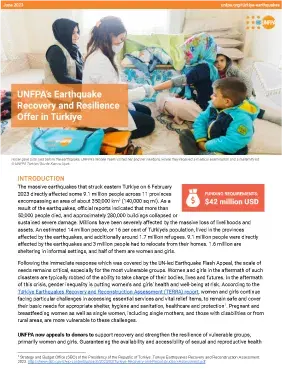The massive earthquakes that struck eastern Türkiye on 6 February 2023 directly affected some 9.1 million people across 11 provinces encompassing an area of about 350,000 km2 (140,000 sq mi). As a result of the earthquakes, official reports indicated that more than 50,000 people died, and approximately 280,000 buildings collapsed or sustained severe damage. Millions have been severely affected by the massive loss of livelihoods and assets. An estimated 14 million people, or 16 per cent of Türkiye’s population, lived in the provinces affected by the earthquakes, and additionally around 1.7 million refugees. 9.1 million people were directly affected by the earthquakes and 3 million people had to relocate from their homes. 1.6 million are sheltering in informal settings, and half of them are women and girls.
Following the immediate response which was covered by the UN-led Earthquake Flash Appeal, the scale of needs remains critical, especially for the most vulnerable groups. Women and girls in the aftermath of such disasters are typically robbed of the ability to take charge of their bodies, lives and futures. In the aftermath of this crisis, gender inequality is putting women’s and girls' health and well-being at risk. According to the Türkiye Earthquakes Recovery and Reconstruction Assessment (TERRA) report, women and girls continue facing particular challenges in accessing essential services and vital relief items, to remain safe and cover their basic needs for appropriate shelter, hygiene and sanitation, healthcare and protection. Pregnant and breastfeeding women as well as single women, including single mothers, and those with disabilities or from rural areas, are more vulnerable to these challenges.
UNFPA now appeals to donors to support recovery and strengthen the resilience of vulnerable groups, primarily women and girls. Guaranteeing the availability and accessibility of sexual and reproductive health (SRH) services and commodities and increasing the effectiveness of gender-based violence (GBV) prevention and mitigating measures is critical to ensuring the rights, safety and dignity of women, girls and groups with specialized needs across the earthquake-affected provinces, as well as in provinces where people displaced by the earthquakes live.


